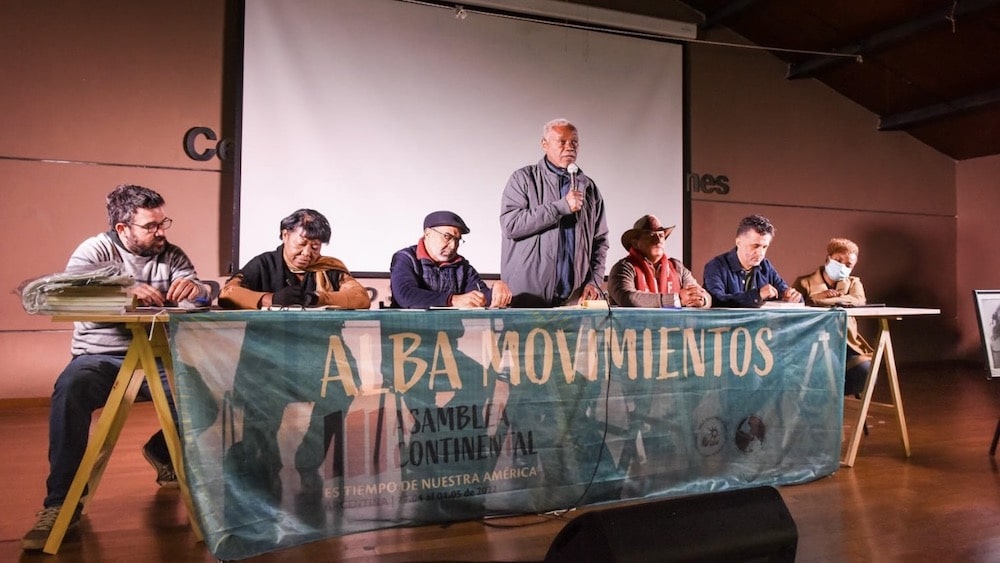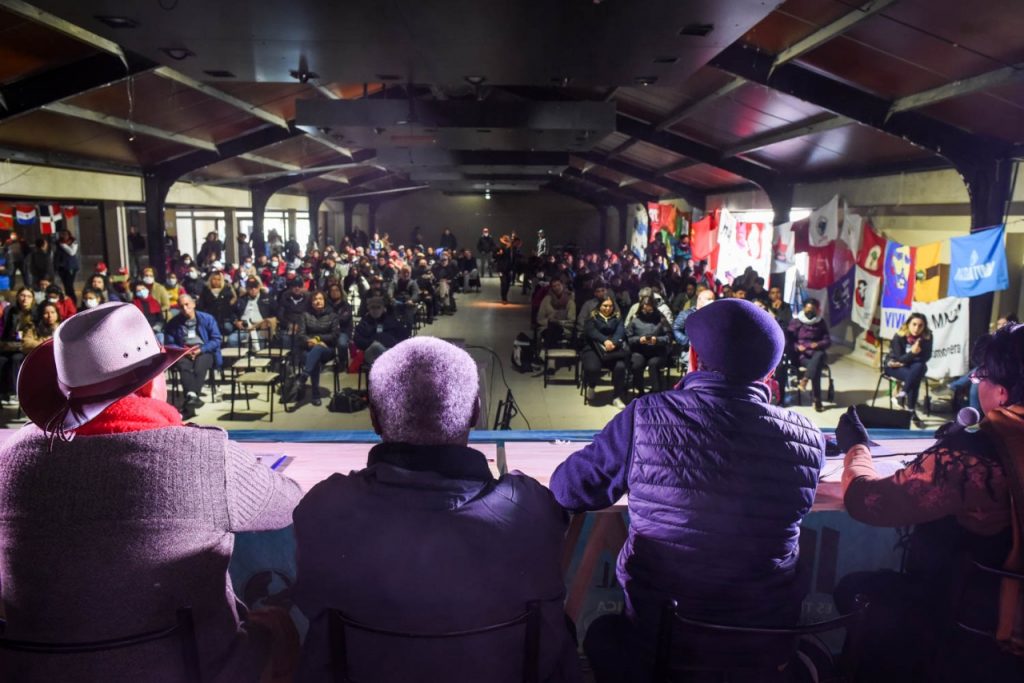
Camille Chalmers of the Assembly of Caribbean Peoples speaks on a panel during the III Assembly of ALBA Movements. Photo: ALBA Movements.

Orinoco Tribune – News and opinion pieces about Venezuela and beyond
From Venezuela and made by Venezuelan Chavistas

Camille Chalmers of the Assembly of Caribbean Peoples speaks on a panel during the III Assembly of ALBA Movements. Photo: ALBA Movements.
During the Third Continental Assembly of ALBA Movements, allied platforms spoke about the importance of building unity and fighting imperialism and capitalism together
A central discussion throughout the Third Continental Assembly of ALBA Movements was on the challenges that people’s movements face in the medium and long term. One of the key strategies that ALBA movements have been strengthening over the last couple of years has been to build not only with organizations involved in its work across the continent but also to work with other platforms of people’s movements and organizations that are resisting capitalism and imperialism.
A panel was organized during the Assembly to hear about the work of these allied platforms and to discuss how to better build solidarity and unity together. Participants heard from Sacha Llorenti the Executive Secretary of ALBA-TCP, Wilman Sarango from Indigenous and Peasant Organizations of Ecuador (FEI) – CLOC La Vía Campesina, Iván González of the Trade Union Confederation of the Americas and the Platform for Democracy and Against Neoliberalism, Akende Chundama of the Socialist Party of Zambia and the International Peoples’ Assembly (IPA), and Haitian leader Camille Chalmers of the Caribbean Peoples’ Assembly.
Wilman Sarango of FEI Ecuador opened the panel by recalling the struggle of peasant peoples against the colonial and republican system for over 500 years. “We, the native peoples, have been resisting, in the struggle to recover our lands that were taken from us by the conquerors,” he said.
The peasant leader explained that the challenge of the popular movements “is to take the lead in the struggle for the construction of a humanist and socialist system against the capitalist, financial and extractivist system.”
Sarango also reaffirmed the commitment of the Ecuador chapter in the construction of ALBA Movements and made proposals to strengthen the work of ALBA: “We must value at the highest level of importance the self-organization of the class; the cultural struggle necessary to build class consciousness; establish a think tank that generates timely analysis of the conjuncture; build a continental movement that brings together the struggle of peasant organizations and people’s movements; build political education schools to develop the ideological battle; develop people’s media in favor of our interests; develop integration policies between ALBA, UNASUR and CELAG.”
RELATED CONTENT: Amid Global Uncertainty, ALBA Movements Forges Unity and Hope
Sacha Llorenti, ALBA-TCP executive secretary, committed himself to work to increase the coordination between the platform of the movements and that of the ALBA-TCP member states.
“This organization is increasingly necessary, in the pandemic we have seen how the system works, we have witnessed how pirate techniques have been used to accumulate masks, respirators, and vaccines. A few countries have been able to accumulate a lot of vaccines and in other regions, such as Africa, the amount of vaccines is scarce. ALBA has shown another way of organizing the world, a world with more solidarity among countries,” he argued.
In his analysis of the world context, Llorenti said that “inequality is one of the threats to humanity” and asked “How can we face these challenges? First we have to know the causes, and they are consequences of the capitalist model of production. If we do not aim to change the mechanisms of capitalist production, we will not change the structural conditions of this system,” he added.
Llorenti concluded that “ALBA is fundamentally an anti-imperialist platform”. He added “today we see the situation of the regional left, where some comrades who declare themselves to be part of the left have lowered the anti-imperialist banner, and imperialism is the way capitalism functions”.
Camille Chalmers, of the Caribbean People’s Assembly, pointed out the challenges for the Caribbean and its work with the continent. “For the peoples of the Caribbean, the work of the movements towards ALBA is the most important strategic space at this difficult time for the peoples of Latin America and the Caribbean,” he explained.
He added that “the Caribbean is a strategic space in several senses. There is a very important struggle for the control of the Caribbean. But imperialism cannot control the Caribbean thanks to the Cuban and Bolivarian revolutions”.
Likewise, he maintained that foreign debt is once again being used for the domination of the region. “We say like Fidel Castro: we cannot pay, we should not pay, we do not want to pay” he stated.

Finally, he called for the unity of Latin America and the Caribbean and maintained that this task is not possible without a clear diagnosis of imperialist domination and without a socialist political project. “We are in a moment where the world is undergoing a transition in world hegemony and it is there that US imperialism becomes more savage, with greater aggression, where they are trying to destroy our cultures and our peoples. It is essential to defend the progressive governments that exist in the region,” he said.
Meanwhile, Iván González, of the CSA and the Platform for Democracy and Against Neoliberalism, said “we reaffirm the necessity of the defense of democracy and the sovereignty of the peoples, but we must challenge ourselves to go further than just the defense of democracy. We need democracy to be expressed in our territories”.
At the same time he expressed “it is necessary to build answers from the popular sectors. The States must understand that the people are part of those answers”.
RELATED CONTENT: Nicaragua Expels OAS: Venezuela & ALBA Approve, Almagro Does Not
Among the challenges, he called for “a discussion on what kind of integration we want for our countries. We must dispute the vision that governments have and learn from the mistakes that were made with the first wave of progressive governments”.
Akende Chundama of the International Peoples’ Assembly and the Socialist Party of Zambia closed the panel and highlighted that neoliberalism has demonstrated time and again that it cannot solve our problems. “Everything as it is put together and structured tries to convince us that there is no alternative. They force us to think that it is easier to think of the end of the world than the end of capitalism,” she said.
She added, “In the face of this, it is important that we unite our forces to put an end to capitalism. One of the biggest challenges we had was that it was difficult for us to unite our struggles, we are all fighting separately, and thanks to the International Peoples’ Assembly we managed to unite our struggles.”
As a solution to the consequences of capitalism she called for building a socialist project. “Only socialism can remedy the consequences of capitalism. We have to defeat capitalism, imperialism and neoliberalism, and for that we have to work together because that is the essence of our struggle” she concluded.
Featured image: Camille Chalmers of the Assembly of Caribbean Peoples speaks on a panel during the Third Assembly of ALBA Movements. Photo: ALBA Movements.